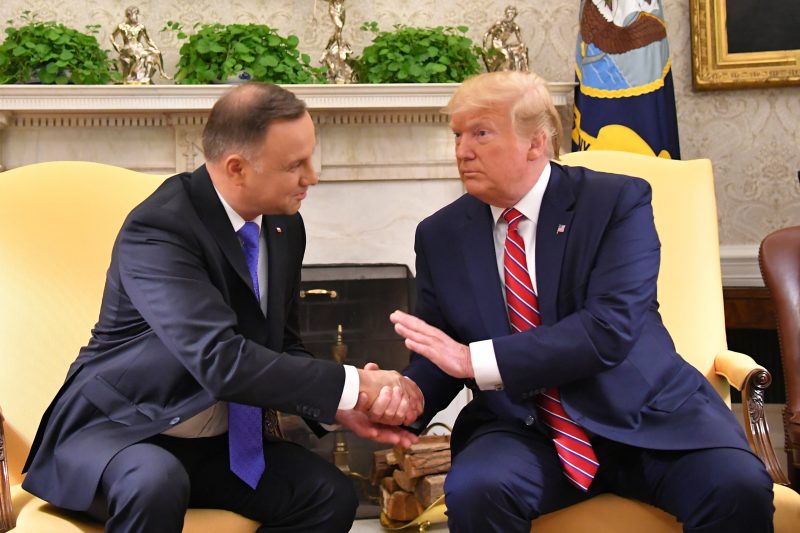Trump says considering 2,000 new troops for Poland
Hosting Polish President Andrzej Duda in the Oval Office, President Donald Trump said there were plans to move an additional 2,000 US troops to Poland from fellow NATO-member Germany (MANDEL NGAN)
Washington (AFP) – The United States is considering sending 2,000 more troops to Poland, President Donald Trump announced Wednesday at White House talks with his Polish counterpart Andrzej Duda — while stopping short of promising a permanent presence.
Trump said the additional US troops would be moved to Poland from fellow NATO-member Germany, but cautioned that the discussions had not been finalized.
“They’re talking about 2,000 troops,” he said. Around 5,000 US troops currently rotate in and out of Poland.
According to Trump, Poland is offering to build a “world class base” for the US troops and he said “this would be a statement.”
But he poured cold water on his Polish allies’ hopes for a full-blown permanent US facility — something that would irritate the Kremlin and almost certainly prompt a Russian response.
“I don’t talk about permanence or not permanence,” Trump said.
Trump said Poland was ordering more than 30 F-35 combat aircraft. In a highly unusual move, two of the advanced planes flew over the White House during Duda’s visit to show off their moves.
On a separate issue at the heart of European-Russia tensions, Trump criticized Germany for what he said was over-reliance on Moscow for energy supplies.
“It really makes Germany a hostage to Russia,” he said, suggesting that he was considering sanctions aimed at blocking the huge new Russian-led natural gas pipeline dubbed Nord Stream 2 natural gas pipeline.
Nord Stream 2, leading from Russia to Germany, would double the amount of gas Russia could deliver.
– Russia worries –
Located far in what used to be Soviet-dominated eastern Europe, Poland is a member of NATO but has long wanted deeper US commitment.
Spooked by resurgent Russia’s seizing control of territory in Georgia and Ukraine over the last decade, Duda has tried to charm the US president, even touting the idea of Poland building a “Fort Trump” to house thousands of US soldiers.
Krzysztof Szczerski, an adviser to the Polish president, said the general concept of a “Fort Trump” was on the agenda Wednesday and that the US presence “will increase both in quality as well as quantity.”
The White House had flagged the Trump-Duda meeting as scheduled to see a “significant” announcement.
It may fall short of what the Poles were hoping for, however.
While US troops already deploy to Poland as part of a rotating NATO presence, a permanent force would thrust American military power one step closer to Russia’s borders.
Likely responses would include the Kremlin increasing military assets in the Russian territory of Kaliningrad, which borders Poland, and possibly also in Belarus, a close ally of Moscow that has resisted hosting a full-scale Russian base on its territory.
– $2 billion sweetener –
In the early 2000s, there were intense talks on deployment of a US anti-missile defense system in Poland, ostensibly to guard against Iranian attacks on Europe but seen by Russia as a direct threat.
With the Kremlin vowing to respond with new nuclear missile deployments, president Barack Obama abandoned the project. In 2018, however, Poland signed a $4.75 billion contract to purchase the US Patriot anti-missile systems — a deal seen as a major boost for attempts to modernize Polish forces.
Duda’s current attempts to woo Trump include promising $2 billion for construction costs of the base he wants, not to mention the only half-joking idea of naming the proposed facility after the publicity-loving president.
But the Pentagon has been less enthusiastic about a base. Both US Army Secretary Mark Esper and then-defense secretary Jim Mattis expressed concerns in September about having adequate space to train soldiers.
What amounts to a diplomatic-military chess game in the long-contested lands between Russia and western Europe is further complicated by Trump’s erratic foreign policy.
The US president has blown hot and cold on Putin and has often spoken disparagingly about his NATO allies.
However, there is strong support in Washington for a tough approach to the Kremlin following its 2014 annexation of Ukraine’s Black Sea Crimea region, open support for Ukrainian and Georgian separatist regions, and frequent incursions into NATO airspace.
In another twist, Trump has been dogged throughout his first term by accusations of improper links to Moscow, ranging from secretive business dealings to benefiting from a Russian influence operation during the 2016 election.
Disclaimer: Validity of the above story is for 7 Days from original date of publishing. Source: AFP.


